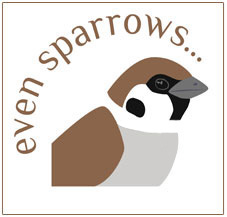

OWLS IN THE BIBLE
Posted: 01.11.24 in Articles category
Owls are the favourite birds of so many people. I know from my experience as a wildlife guide in North-East England that owls provide their 'wow' moments when people are watching birds. Many of my customers have told me that the sight of a Short-eared Owl hunting in daylight among the sand dunes was the memory they treasured after a day out with me on Holy Island. Watching the bird flying slow and low, back and forth, as it hunts for voles and other prey. Seeing its large and enigmatic yellow eyes that seem to stare at you. For others the Barn Owl is their favourite. A ghostly white apparition at dusk hovering above the field margin - always mysterious and a special encounter.
It's interesting to note that owls are one of the most featured kinds of bird in the Bible. All eleven biblical references are found in the Old Testament. They feature in eight books, mainly in the prophetic writings with Isaiah alone having four references. Unlike our contemporary positive feelings towards owls, none of these references suggest that people in ancient Israel viewed the birds with affection. On the contrary, it seems that people were fearful of owls and what they signified.
Let's look at a representative selection of the Bible's references to owls:
These are the birds you are to regard as unclean and not eat because they are unclean: .... the horned owl, the screech owl.... the little owl... the great owl, the white owl, the desert owl....
LEVITICUS chapter 11 verse 13, 16-18
The large number of owls listed with six different 'species' mentioned is particularly noteworthy . No other family of birds is separated out and identified with such a number of species, even though we know today for example that there are even more kinds of eagle than owl in the 'bible lands'. Two owls are identified in terms of their size (great and little owls), two in terms of appearance (horned and white owls), one in terms of habitat (desert owl) and one on account of a sound it makes (screech owl). Whether or not these are identifiable as birds found in the region today, we should recognise that a mix of four qualitatively different criteria were evidently used to separate and distinguish between them. Presumably people were familiar with seeing at least four of these owls, perhaps a fifth (i.e. the desert owl), but not necessarily with seeing the screech owl - identified on the basis of its piercing call. Only three of these owls are featured elsewhere in scripture; there are no further references to horned, little or white owls. Five of these references speak of owls generically, but the psalmist, Isaiah in chapter 34 and the prophet Zephaniah all specifically mention the desert owl. The latter two also mention the screech owl which they apparently link with desert owls. Isaiah in chapter 34 is alone in mentioning the great owl which he links with the raven as a bird breeding in the desolation of Edom.
I have become a brother of jackals, a companion of owls.
JOB chapter 30 verse 29
Job's claim was part of a lengthy, personal lament. Earlier in the same chapter he accused God of attacking him despite his pleas for mercy: I cry out to you, God, but you do not answer; I stand up, but you merely look at me. You turn on me ruthlessly; with the might of your hand you attack me. You snatch me up and drive me before the wind; you toss me about in the storm. I know you will bring me down to death, to the place appointed for all the living. (Chapter 30 verses 20-23). Job lamented his physical suffering and social humiliation, sensing that he had become an outcast whom others detested and avoided. He perceived the only 'friends' left for him were wild dogs and owls.
I am like a desert owl, like an owl among the ruins. I lie awake; I have become like a bird alone on a roof.
PSALM 102 verses 6, 7
This cry is quite similar to the words from Job. The psalmist prayed to God to hear him, but sensed that God was not listening. He was physically weak, abused by people who taunted him and he groaned in his distress. The psalmist likened himself to a solitary owl, living like an outcast in an uninhabitable place. In the early verses he painted a picture of isolation and alienation, yet he continued the psalm with words of praise and a declaration of hope in God's unchanging nature. But what of the owl? Did the psalmist presume desert owls to be solitary? Was that a phenomenon he had observed?
The wild animals honour me, the jackals and the owls, because I provide water in the wilderness and streams in the wasteland....
ISAIAH chapter 43 verse 20
In contrast to Isaiah's previous references to owls, his above words are a delightful verse about God's loving provision even for animals and birds that people despised. The prophet noted that God provided water for these desert creatures at the same time as He gave drink to Israel as His chosen people. Israel however did not express gratitude, unlike the owls and jackals which honour God. Here God loves even the unlovely creatures like owls and they in turn honour Him.
Overall, this biblical material raises various questions. Here's a trio to consider:
1. Why do you think owls are so popular today?
2. Do you relate to the psalmist's self description as a solitary owl?
3. Can we learn from owls honouring God?